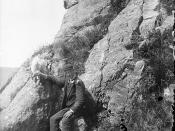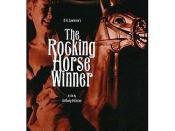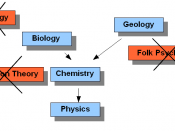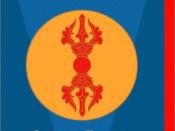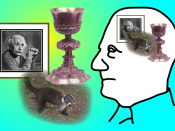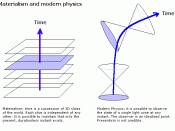When the word fantasy is used, one often conjures images of talking animals or fairies or dragons from distant, awesome worlds. However, fantasy may also describe strange behaviour within ordinary people. Although their behaviour is unrealistic and improbable, it provides an important message about humanity and the way in which people may view the world. Fantasy in this sense, embodies underlying symbolism into the truths about human beings in today?s world. These truths are not only virtues, but also human faults. In the story, ?The Rocking-Horse Winner?, fantasy is used to symbolize the endless, destructive efforts of materialism within the world. Materialism means many things: love of possessions or material things, concern for comfort, pursuit of wealth. It appears innocent to the naked eye, but when in reality, it is a chronic problem that affects most of the Western world today. Westerners live in a society on a pursuit for materialism.
Their homes are rich and lavish, full of beautiful, yet functionally useless, gizmos that appeal to their visual tastes. People frown upon individuals who drive a beat up Chevette, but react with respect and envy to the individual driving the Mercedes Benz, when both vehicles are capable to drive from one place to another. There is a growing pressure to have new, and expensive things no matter the cost because it displays the worth of a person. With this growing hunger for new things, a person experiences distress and frustrations to be content in life. Family and career responsibilities are forgotten when materialism becomes the ultimate factor in one?s life. The main problem with materialism is that it does not end. When a person obtains their object of desire, the need for even more new objects increases. A satisfaction for one?s worth in life becomes an impossible feat to achieve. The costs of materialism in family life are seen in the story, and it begins with the mother.
The mother in the story is a very materialistic person. She describes with bitterness to her son, Paul, the reason for not having a car, ?[?] we?re the poor members of the family [?] it?s because your father has no luck [?] If you?re lucky you have money? (284-85). The mother is resentful for having no luck, and thus, no money, which shows her dissatisfaction for not having a materialistic thing; a car. They are not poor and have a pleasant house and servants. It is her expensive tastes and pursuit for materialism that make her feel bitterness towards her life and family. Her attitude compliments the fantasy seen in the story.
The first sign of fantasy occurs when the house becomes haunted by the unspoken phrase: ?There must be more money!? In reality, no house can whisper phrases for people to hear, but Paul and his siblings hear this phrase over and over. When Paul believes he is ?a lucky person?, he begins to ride his rocking horse furiously, strangely trying to reach where he wants to go, and says, ?Now, take me to where there is luck! Now take me!? (286). His absorbing rides are symbolic of the pursuit for materialism in the world. People who are materialistic are always trying to reach an end, but never do. The description of his eyes while he is riding is also symbolic of a materialistic person?s own narrow and self-centred desires, ?staring fixedly [?] glassy-bright [?] blue glare [?]? (285-86). Luck has a serious impact on materialism in a person?s life.
Paul discovers that if he rides his horse long enough, he finds the name of the winning horse for the upcoming race. He explains his horse to his Uncle Oscar: ?Well, he has different names. He was called Sansovino last week [?] won the Ascot? (286). Paul?s divinatory ability is an element of fantasy. It gives him confidence to gamble money on horse races. When he wins, he considers this to be a sign of having luck. Paul is becoming intoxicated on the greedy feeling of having more money, which is symbolic of the same feelings ordinary people experience while on their pursuit of materialism. He believes that by giving a large sum of money to his mother, the whispering in his house will halt, and make his mother content. The result is chilling and opposite to what Paul expects: Then something very curious happened. The voices in the house suddenly went mad, like a chorus of frogs on a spring evening. There were certain new furnishings, and Paul had a tutor. He was really going to Eton, his father?s school, in the following autumn. There were flowers in the winter, and a blossoming of the luxury Paul?s mother had been used to. And yet the voices in the house, behind the sprays of mimosa and almond blossom, and from under the piles of iridescent cushions, simply trilled and screamed in a sort of ecstasy: ?There must be more money! Oh-h-h, there must e more money. Oh, now, now-w! Now-w-w ? there must be more money ? more than ever! More than ever! (291) This fantasy is symbolic to the mother?s increasing desire for more wealth as she spends her family?s money. It is a human fault showing that greed for wealth or materialistic things is a serious problem that only worsens. Paul?s own obsession for money leads him to severe consequences in his life. Paul becomes fearful of the whispering in the house, and knows he must find the name of the horse for the upcoming horse race to win more money and quiet the whispers. He rides more furiously than ever, all night, until he collapses with illness and cries, ??[?] I know it! It?s Malabar!??(294). On the last night of his life, Paul discovers that Malabar was truly the winning horse and he has made a gigantic sum, over eighty thousand pounds. He reveals the truth of his crazed obsession for money to his mother: ??Do you think I?m lucky, mother? I knew Malabar, didn?t I? Over eighty thousand pounds! I call that lucky, don?t you, mother? [?] if I can ride my horse, and get there, then I?m absolutely sure ? oh, absolutely!?? (294). He dies from his illness and leaves his entire earnings to his mother. His death symbolizes the measures that people will take to become wealthy and fulfill their materialistic desires. In the end, money was gained, but a life was lost and that is certainly not worth being materialistic. Materialism portrays human faults more than human qualities.
In the story, ?The Rocking-Horse Winner?, fantasy is used to symbolize the endless, destructive efforts of materialism within the world. Materialism is a problem that affects so much of the Western population. It is represented by Paul?s mad journeys into nowhere and his lust for money. By using fantasy in this short story, the strange behaviour of people symbolically explains the destructiveness caused by materialism in people?s lives. Materialism is unending, and affects not just one person, but everyone in that person?s life. The unrealistic situations provide an understanding of the truths about humanity and the seriousness of the problem that is growing rapidly without end in the world.
Bibliography Lawrence, D.H. ?The Rocking-Horse Winner.? Story And Structure. 7th ed. San Diego: Harcourt, 1988. 283-94
